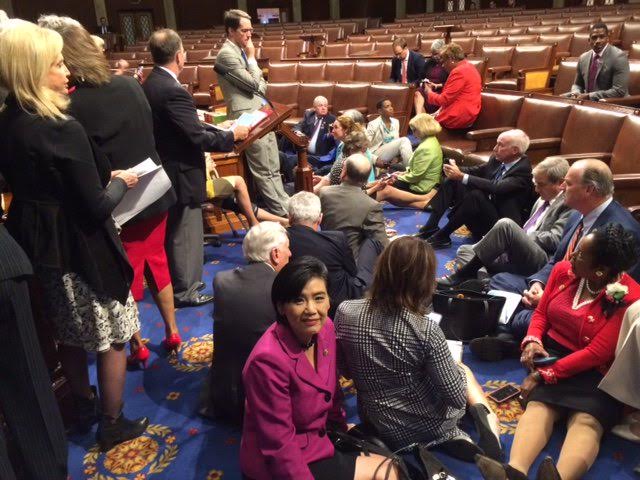Following the U.S. Supreme Court’s ruling in favor of affirmative action Thursday on Fisher v. University of Texas, a group of more than 160 Asian and Pacific Islander American organizations applauded the decision.
The 4-3 ruling means that schools, under the Equal Protection Clause of the U.S. Constitution, may use race as a factor in their admissions policies.
Jin Y. Hwang, president of the National Asian Pacific American Bar Association (NAPABA), said in a statement Thursday that the Court “affirmed the important role race-conscious admissions policies have in ensuring diversity in our nation’s colleges and universities.”
The association, alongside more than 160 other APA organizations, had filed three amicus briefs — which are submitted by parties not involved in a case — and signed an open letter last month to support the University of Texas and to voice their support of affirmative action that does not constitute quotas, discrimination, or bias against Asian Americans or any other minorities of color.
“Affirmative action simply takes into account whether an applicant has overcome significant obstacles and institutional barriers … as one of several factors in a holistic review of an applicant’s qualifications, leadership and potential,” the letter read.
President Barack Obama, whose administration had supported the university, said from the White House that he was “pleased that the Supreme Court upheld the basic notion that diversity is an important value in our society and that this country should provide a high-quality education to all our young people regardless of their background. We are not a country that guarantees equal outcomes, but we do strive to provide an equal shot to everybody.”
The case, first considered by the Court in 2013, started when Abigail Fisher, a white student, was denied admission to the University of Texas at Austin in 2008. Fisher filed a lawsuit alleging discrimination on the basis of her race.
“We are pleased that the U.S. Supreme Court acknowledges the continued need for affirmative action policies that make it possible for students of all backgrounds, including many historically disadvantaged Asian American and Pacific Islanders, to access higher education and create a stronger country through their contributions to a diverse society,” said Mee Moua, president and executive director of Asian Americans Advancing Justice (AAJC).
Not all Asian Pacific Islander American organizations agree on supporting affirmative action — last month, another group representing 130 Asian American organizations, Asian American Coalition for Education (AACE), filed a complaint with the U.S. Department of Education accusing three Ivy League institutions, Yale University, Dartmouth College and Brown University, of practicing discrimination against Asian Americans in their admissions policies.
AACE filed a similar complaint against Harvard University last year that was later dismissed as being too close in complaint to another lawsuit filed by conservative activist Edward Blum — the force behind bringing the Fisher case before the high court — against Harvard and the University of North Carolina at Chapel Hill.
In their complaint, the coalition cited a 2009 study by two sociologists, Thomas Espenshade and Alexandria Radford, in which, on average, Asian Americans were found to need to score 140 points higher than whites, 270 points higher than Hispanics and 450 points higher than blacks on the SAT to have the same chance of admission to schools. AACE said the three institutions use admissions policies labeled as “holistic” that “allows admissions officers to apply negative stereotypes based on racial and cultural biases and misunderstanding to justify discrimination against individuals of an undesired ethnic group.”
In a statement to Kore, Yale University spokesman Thomas Conroy said the school’s admissions committee “conducts a personalized, holistic, and contextual evaluation of each applicant. All relevant factors are considered in the contest of the application as a whole, and the decision on any applicant does not turn on any one factor alone. In conducting a holistic review, applicants are not disadvantaged in the admissions process on the basis of race or national origin.”
AACE could not be reached for comment on the Court ruling.
Betty Hung, AAJC Los Angeles policy director, said the 160 APA organizations in favor of affirmative action are seeking to counter the narrative that affirmative action harms Asian Americans and to focus on the public education of what the policy really aims to do.
“It’s important to highlight what affirmative action is and what it’s not,” Hung said. “It takes into account whether an applicant has experienced adversity or ethnic struggles, and takes his or her life experiences into account as well, with respect to race. It’s not a support for racial quotas.”
“Today’s ruling is a victory for all Americans,” NAPABA, AAJC and the Asian American Legal Defense and Education Fund said Thursday. “Affirmative action policies have been used as an effective tool to promote equality, ensure qualified students from all backgrounds get a fair chance at higher education, and acknowledge that race is relevant context in considering an individual’s application. With today’s decision, the most vulnerable AAPI students, along with other students of color, will continue to have equal opportunity to enter the institutions that shape tomorrow’s leaders, and we continue to affirm that race, as distinct from class, matters.”





